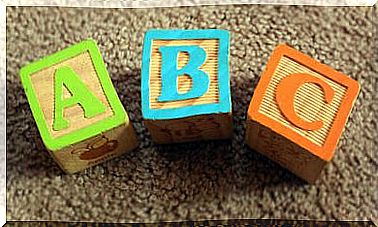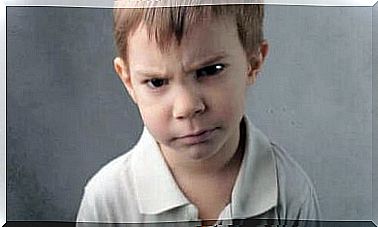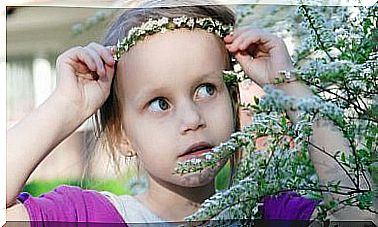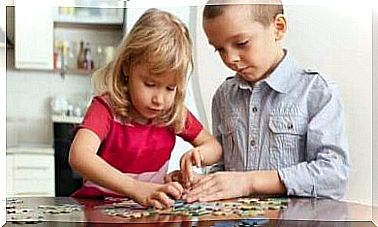When A Mother Suffers From Depression: Effects On The Children

Depression during pregnancy and after childbirth is much more common than you might think. In addition, many women suffer from this condition for years. This then also influences the way in which they fulfill their parenting role. Once you understand the impact a mother’s depression has on her children, you can begin to take appropriate action.
Many of the symptoms associated with depression can easily be confused with experiences that are normal during pregnancy and after childbirth. As a result, there is a very great risk that many women will go undiagnosed and receive the treatment they need. This only makes the situation worse.
However , it is not only women who are affected by depression. It also affects everyone around them, especially their children. When we consider that early childhood is the crucial phase in a person’s development, it becomes apparent that these early childhood experiences can also affect the further lives of children.
How does it affect children when their mother is depressed?
Even during pregnancy, children of depressed mothers have a higher heart rate. In addition, there is an increased risk of premature birth and the baby’s birth weight may also be lower. Later on, these babies are often not as active and react less to facial expressions and voice. They also have more stress hormones in their bodies compared to other babies.
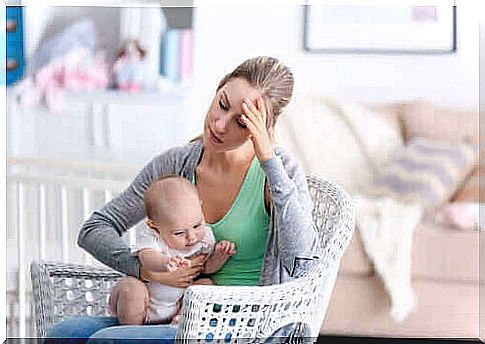
At the same time, these children are more likely to develop mood disorders and have difficulty adjusting socially and academically. In addition, it is believed that depression in the mother could also have an impact on the intelligence and health of the children. After all, these children also have an increased risk of developing depression themselves in the course of their lives.
However , these complications and difficulties do not occur in all children of depressed mothers. We can therefore assume that there is no direct or unambiguous connection. Rather, we recognize that other factors also have an influence on this development.
How do these effects manifest themselves?
The quality of the bond between mother and child
Building a healthy and strong bond between mother and child is vital to the wellbeing and development of little ones. When a mother suffers from depression, however, it is often very difficult for her to correctly identify and then satisfy all of her child’s needs.
In addition, these mothers often have trouble correctly interpreting their baby’s reactions. This affects the mother’s communication with her child, which can be very irritating for the babies.
In some cases, the mother may fail to meet the child’s needs or not respond appropriately and inconsistently to the needs. This can lead to an insecure bond that can be emotionally very detrimental to the child. Of course, none of this happens willfully. The depression itself prevents the mother from perceiving the signals and signs from her child and from reacting to them accordingly.
Marital problems
Another very important aspect that also affects the children is the relationship between the parents. When a parent is depressed, it inevitably affects their relationship with their partner.
In these cases, there is often no positive communication at all. At the same time, the number of disputes and mutual allegations is increasing. In addition, only a few couples manage to resort to appropriate conflict resolution strategies in these situations.
This also makes the situation even worse. When children frequently experience the quarrels and conflicts between their parents, it has a significant impact on many aspects of their personality and development.

Lack of stimulation
Mothers who suffer from depression are less actively involved in child-rearing. Because they often feel apathetic and desperate, they can offer their children less learning and development opportunities. They also spend less time stimulating their children sensory and intellectually.
In addition, they exemplify an unsuitable behavior model for their child. The little ones grow up in an environment in which their mother’s life is determined by sadness, disinterest and exhaustion. If this condition persists for a long time as a child grows up, it will to some extent affect the child’s personality.
How can you reduce the effects on your children when you have depression?
If you want to avoid this situation , we must first deal with a mother’s depressed state. It is important that you pay attention to any symptom, especially after the baby is born. Not only is it perfectly fine for you to seek help, it is absolutely necessary.
However, the help of a specialist is only part of the solution. Additionally, we can minimize the effects of depression by also paying attention to the accompanying factors.
It is important that we offer our children appropriate stimuli, encourage them adequately and respond appropriately to their needs. In addition, we should strive to provide them with a positive family environment that will help reduce the impact maternal depression can have on their development.

